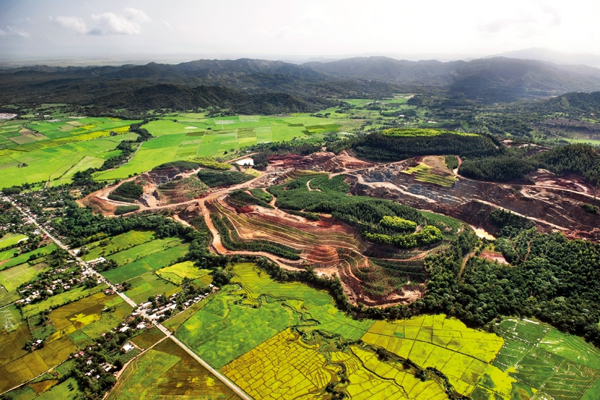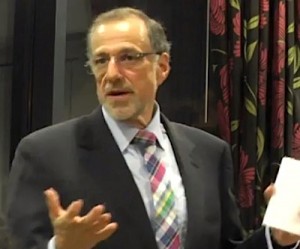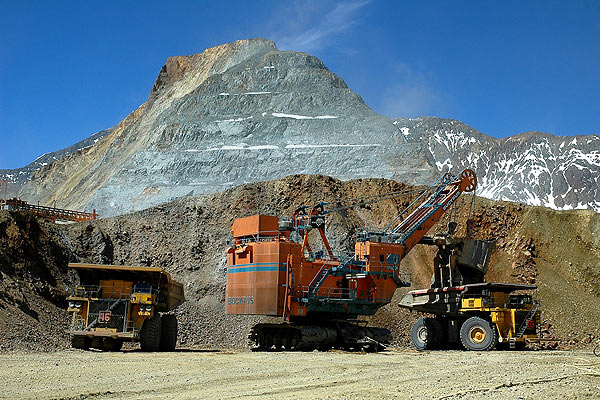Trevali discovers new zone at New Brunswick project |
- Trevali discovers new zone at New Brunswick project
- Glasenberg pooh-poohs Anglo takeover
- Glencore’s Dominican mine saved by the President
- Australia kills unpopular mining tax
- MINING.com staffer a Jack Webster Award finalist
- Anglo American to pay $4.5m for environmental breaches in Chile
| Trevali discovers new zone at New Brunswick project Posted: 03 Sep 2014 02:37 PM PDT After an early bump Trevali Mining (TSE: TV) shares pared gains on Wednesday after announcing exploration drilling at its 100% owned Stratmat property in New Brunswick has discovered a new copper-gold zone. In early afternoon trade the Vancouver-based junior was changing hands at $1.31 on the Toronto Exchange, affording the company a $370 million market value. The counter is up 28% year-to-date on the back of rising zinc prices and after raising the necessary funds last year to recommence production at the Caribou mine and mill complex located in the Bathurst mining camp. The company's Caribou zinc-lead-copper-silver-gold project is made up of the Stratmat, Halfmile and Caribou deposits. "The fact that after approximately 50-years of property-wide exploration the Trevali exploration team, using the latest exploration technology, can model, predict, target and discover significant new blind massive sulphide mineralization is highly encouraging and bodes well for ongoing future discoveries at Stratmat and within the Bathurst Mining Camp," said Mark Cruise, Trevali's President and CEO. According to the Caribou Preliminary Economic Assessment – the company's first National Instrument 43-101 compliant mine plan for the project – released in May initial construction could start this quarter with an expedited restart at Caribou in Q2 2015. Pre-production initial capital costs are pegged at $36m with a semi-autogenous grinding (SAG) mill already on site for existing infrastructure of 3,000 tonnes per day plant, a geochemical laboratory and tailings treatment facility. The PEA outlines a 6.2 million tonne resource grading 6.11% zinc, 2.49% lead, 0.34% copper, 67.9 g/t silver, and 0.86 g/t gold. Life of mine (6.3 years) average annual production is estimated at 93 million pounds of zinc, 33 million pounds of lead, 3 million pounds of copper, 730,000 ounces of silver and a some 1,500 ounces of gold. Cash costs for Caribou came in at $0.46 per pound zinc equivalent with total site operating cost of $74.77 per tonne milled. Trevali, which took ownership of the complex in 2012 after acquiring Maple Minerals in an all-stock deal valued at $22 million, said approximately 300 permanent fulltime positions will be created resulting and $57 million in direct royalties and tax payments. Trevali can also haul ore from its 100%-owned Halfmile deposit located 20 kilometers south, while it builds up underground mine infrastructure at Caribou. Trial mining at Halfmile was conducted in 2012 and the ore was shipped to Glencore Xstrata's Brunswick #12 mine for processing. In Peru, the company is actively producing zinc and lead-silver concentrates from its Santander mine and 2,000-tonne-per-day metallurgical plant. |
| Glasenberg pooh-poohs Anglo takeover Posted: 03 Sep 2014 01:49 PM PDT Speaking at his old hunting grounds in Johannesburg, Glencore (LON:GLEN) CEO Ivan Glasenberg dismissed the idea of a takeover of diversified peer Anglo-American (LON:AAL). The question was put to Glasenberg because yesterday Mark Cutifani told the Wall Street Journal he's open to the idea saying "if someone sees value, then there's a conversation to be had." Glasenberg clearly doesn't see any value in such a conversation; not at the moment anyway: "With Anglo, we don't trade diamonds, if that gives you a good idea, and we don't trade platinum," Glasenberg told reporters in Johannesburg today. "We will only look at assets which we trade, which we market," he said in response to a separate question. Cutifani is in the process of getting rid of the South African platinum mines and Anglo's De Beers diamond business could simply be bolted onto Glencore's trading operations which means Glasenberg may just be unwilling to show eagerness at this point. Anglo's share price is up 20% this year and Glasenberg would not want it to get any more expensive under Cutifani's cost cutting and divestment strategy. Although there may be some anti-trust issues (and regulators, particularly in China would probably seek concessions a la Las Bambas) there are synergies and up to $1.5 billion in cost savings in a tie-up: "Glencore would greatly increase its trading market share in some key commodity markets, including copper, coal and nickel," [Jefferies LLC analyst Chris] LaFemina said. "Anglo would also give Glencore a strong presence in the seaborne iron ore market which we would argue is an ideal market for commodity traders." There's a little bit of history of course. Back in 2009 Xstrata floated a "merger of equals" with Anglo American, which valued the two companies at around $33 billion (not far off Anglo's current market value and more than what Glasenberg paid for Xstrata – more evidence of the stasis in mining's top tier). That proposal was declared "dead and buried" even before an official bid was launched. In hindsight South African-born Mick Davis, Xstrata's chief executive at the time, may have fought a little harder and made the deal a little sweeter had he known that Glencore would kick him out as CEO in what turned out to be nothing like the merger of equals the Glencore deal was first billed as. That Davis, who like Glasenberg cut his teeth in the coal trade in Johannesburg in the 1980s, was mentioned as a possible successor to Cynthia Carroll when she was ousted from Anglo in 2012 only adds spice. Glasenberg, probably the most upbeat CEO in mining these days, summed up Cutifani's approach as "someone's going to take him over, he's happy." If it were that simple. Just ask Mick Davis. |
| Glencore’s Dominican mine saved by the President Posted: 03 Sep 2014 12:24 PM PDT  The Falcondo mine is located in the forested Loma Miranda mountains, less than 100 km north of the capital Santo Domingo. A proposal to create a new national park that would have blocked the expansion of Glencore's (LON:GLEN) ferro-nickel Falcondo mine in the forested mountains of the central Dominican Republic was vetoed Tuesday night by President Danilo Medina. El Periódico reports (in Spanish) that the authority sent the ruling back to the Senate, saying he had "serious doubts" about the constitutionality of such decision, as it does not respect the country's mining law nor takes into account international treaties signed by the Dominican Republic. Medina also said there is no scientific prove that the mine expansion would damage the area, covering about 16 square miles. However, the President noted his veto did not mean he has approved the project, which he said would only be authorized after the company completes "all the required environmental impact studies." Glencore has mined for nickel in the area through the now absorbed Canadian Falconbridge since 1971, and was seeking permits to expand its operations on about 3,400 acres (1,380 hectares) near the town of Bonao. Billions in compensation A lawyer for the mine has said in the past that the government would have had to pay around $4 billion in compensation had the President declared the area a national park. The project in Loma Miranda, less than 100 km north of the capital Santo Domingo, has been the focus of relentless environmental protests for years. The firm's plans to expand Falcondo received a setback earlier last year when the United Nations Development Program (UNDP) rejected an environmental impact study, qualifying it as "incomplete." A UN panel also said the project would endanger water supplies, wildlife and wetlands. Both the Senate and Chamber of Deputies passed the bill last month by wide margins amid a combination of environmental concerns and fears that multinational mining companies may be benefiting more than the public from the country's natural resources. |
| Australia kills unpopular mining tax Posted: 03 Sep 2014 11:14 AM PDT Australia's government has finally revoked an unpopular tax on mining companies' profits, fulfilling a pledge made during last year's national election and handing Prime Minister Tony Abbott, who took office last year, a political victory. The decision to scrap a 30% tax on profits on coal and iron ore mining, which was seen as one of the primary reasons behind the downfall of the previous government, passed by a narrow margin on Tuesday, The Australian noted. It was possible after conservative leaders struck an unexpected deal with mining tycoon-turned-politician Clive Palmer's United Party, which holds the balance of power in the upper house of Parliament. Palmer's party agreed to the move in return for certain concessions, which include freezing the government's contributions to state pensions and keeping a bonus program for school children. "The mining tax was possibly the most stupid tax ever devised," Abbott said in Parliament, having convinced opponents to drop resistance that saw an earlier repeal effort fail a few months ago. The bill is now heading to the House of Representatives where it is expected to pass as well. Hearts divided But not everyone is happy. Jennifer Westicott, CEO of the Business Council of Australia, told The Sydney Morning Herald she was "disappointed" with the maintenance of certain provisions in the Mineral Resources Rent Tax (MRRT) repeal. She claimed the MRRT still acts as a "burden on Australia's already unsustainable medium-term fiscal provision." This is not the first time Australia repeals a controversial tax. In July, it became the first developed nation to repeal its carbon tax legislation. The laws had sought to put a price on greenhouse-gas emissions, but generated years of political debate. Australia's economy is heavily dependent on mining, which has contributed to it being one of the world's largest per capita greenhouse gas emitters. However, the carbon tax has been blamed for higher energy bills and living costs. |
| MINING.com staffer a Jack Webster Award finalist Posted: 03 Sep 2014 09:57 AM PDT MINING.com's coverage of Pascua Lama was recognized by the Jack Webster Foundation today and selected as a finalist in the category Execellent in Digital Journalism. Ana Komnenic, former assistant editor at MINING.com, was chosen for her piece: TIMELINE; Pascua Lama – from $1.5 billion to $8.5 billion to suspension. The digital journalism award recognizes ". . . outstanding BC-based journalism that maximises the creative use of digital tools and platforms – text, videos, audio, slideshows, interactivity, data and social media etc – to tell a story of interest to British Columbians." Other finalists in the same category include the following:
The winner will be announced October 29, 2014. |
| Anglo American to pay $4.5m for environmental breaches in Chile Posted: 03 Sep 2014 09:31 AM PDT Chile's environmental regulator SAM has imposed a $4.5 million fine on Anglo American Sur, a subsidiary of London-based Anglo American (LON:AAL), for violations at one of the five copper mines it operates in the country. According to the authority (in Spanish), the giant miner violated 16 environmental rules at El Soldado mine, located about 130 km northwest of capital Santiago. The breaches came to light during a mine inspection last year and are related to the management of reforestation, wildlife and rainwater, as well as to water pollution with sulphates and sodium, amongst others. Five are considered to be severe while the others were minor, the authority said in a statement. Anglo's subsidiary said (in Spanish) it has begun addressing all of the issues and that while it has five days to appeal the verdict, it has not yet decided whether to do so. The company noted it has reforested about 130 hectares and will have completed more than 320 hectares by the end of the year. El Soldado mine produced around 46,900t, 53,894t and 51,500t of high-purity copper cathodes and concentrate in 2011, 2012 and 2013 respectively. The division consists of an open cut mine, an underground mine, crushing plants and oxide and sulphide ore treatment facilities. Image from archives. |
| You are subscribed to email updates from MINING.com To stop receiving these emails, you may unsubscribe now. | Email delivery powered by Google |
| Google Inc., 20 West Kinzie, Chicago IL USA 60610 | |




0 Comment for "Trevali discovers new zone at New Brunswick project"